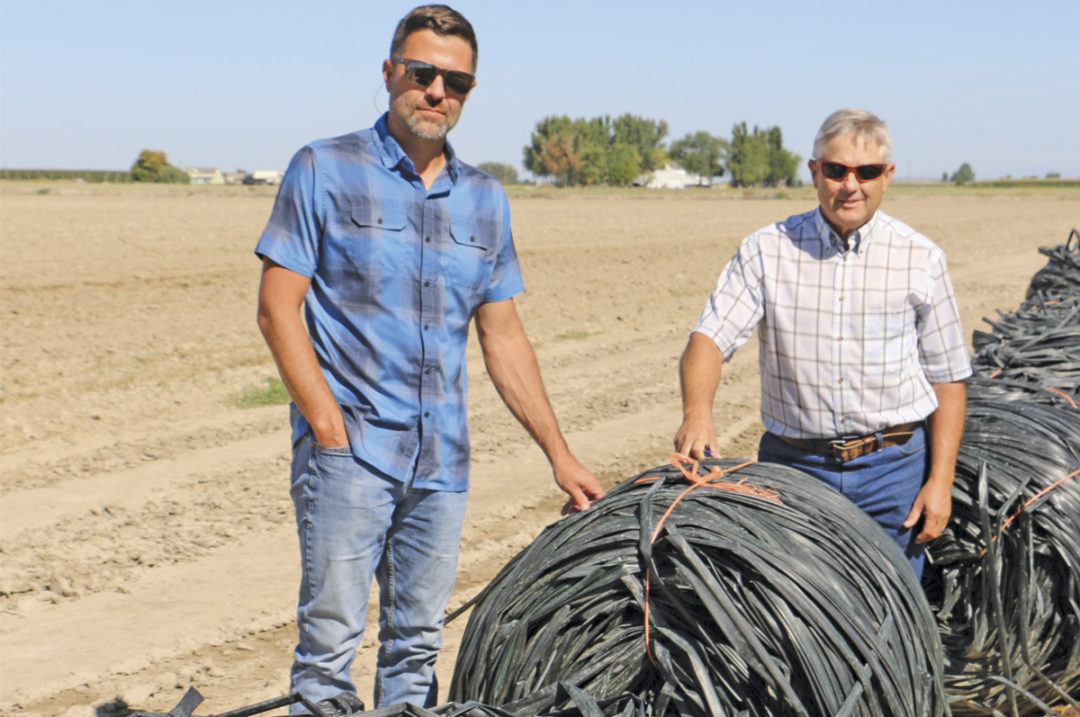In the lush agricultural landscapes of western Idaho, single-use drip tape has long been a prized tool for irrigating a variety of crops, including onions, peppers, hops, vineyards and mint. This fine-tuned irrigation method gives farmers precise control over water distribution, ensuring optimal crop growth. However, this technological advancement comes with a downside – a growing environmental concern tied to the disposal of used drip tape.
Each spring, as the Treasure Valley awakens to another farming season, an estimated 20-30 semi-truck loads of drip tape enter the region in preparation for onion crops alone. At the end of the growing season, this indispensable tool is retrieved from the fields, but it emerges far from pristine. Filled with water and residue from the fields, it transforms into a heavy and unwieldy burden, creating a dilemma for local farmers.
“We use drip tape on several crops,” says Wes Freeman, row crop manager at Obendorf Farms. “Last year was a short water year, and we even used it on sugarbeets to help conserve water. It’s not necessarily very cost-effective for sugarbeets, but it helped us get a crop in a short water year.” Obendorf Farms grows 800-900 acres of onions each year, all under drip tape, “and those rolls add up,” he says.

Loosely wound drip tape bundles full of mud are hard to handle and have become a problem for farmers and landfills to handle. Photo by Lynn Jaynes.
Kasey Garrett, owner of Aqua Irrigation Technologies in Parma, recognized the escalating issue. He explains, "We could see that rolls of drip tape for disposal were a problem. For a number of years, farms were rolling up the tape in big, loose bundles, but it was still full of water and dirt, which made them heavy and hard to manage. And then the landfills started limiting what they could handle, so there's stockpiled 'dirty' tape bundles all over."
Jennifer Riebe, a Payette County commissioner, became aware of the problem and sought a solution. "We don't want to hurt the growing, thriving onion industry, but the drip tape in landfills is becoming a problem, and we want to work with growers to figure out some solutions," Riebe says.
Payette County Landfill Manager Gary Kelley says, “Bundles of drip tape take up space and don’t compact. Three or four years ago we were getting it from all over – Malheur County, Washington County, Canyon County – everywhere. And we were just getting overrun with it. If you drive around Payette County now, you’ll see acres of it stockpiled here and there, and that makes us a little nervous. During slack time, the farmers want to just haul it to us all at once from their stockpile, instead of little by little as they gather it. A truck brings a load of it, maybe 30 to 40 rolls at a time, and we have to cover that with other trash. Then when we drive over it, it wraps around the tracks of the compactors and push loaders. Besides the space issue, it’s just hard to deal with.
“We’ve talked to the supervisors at the Canyon County landfill, and they accept one or two loads a day [of drip tape] is all, because they were getting too much, too. It’s becoming a problem,” Kelley says.
In a bid to address this environmental concern, Riebe reached out to Kasey Garrett for his expertise and perspective.

Kasey Garrett of Aqua Irrigation credits the main success of the Mega Binder to the pinch rolls that force the tape to drain, creating lighter and more compact rolls for recycling. Photo by Lynn Jaynes.
Aqua Irrigation, founded by Kasey Garrett and his brother Corby 11 years ago, initially responded to farmer demands for a comprehensive solution in the drip tape industry. "That wasn't available in the drip tape industry, so that's what the need was, for a one-stop shop where all elements for a drip tape system would come together," says Kasey. They began by offering drip tape packages that included various sizes and emitter spacing, different tape thicknesses, filtration and pump systems, and services related to the equipment.
Recognizing the necessity for a holistic approach that included the disposal problem, Garrett's team introduced the Andros Mega Binder retrieval system. This innovative system not only rolls up the tape but also siphons off water and dirt during the process, resulting in smaller, cleaner tape bundles, which can be recycled. The compacted tape rolls each weigh between 750-1,000 pounds. Freeman says they’re getting 14-15 acres of drip tape per roll on their farms.
Ben Andros, owner of Andros Engineering in California, designs and manufactures agricultural equipment, including the Andros Mega Binder, and says, “We could see the need to help farms manage the drip tape after it’s used, to help get it recycled. If you can aggregate enough recyclable plastic, then there are facilities that will wash it, grind it and pelletize it, and it can be sold to make new products at that point. We’re not talking about just several farms of it, but millions of pounds of it.” The facilities that recycle it are in California where drip tape is used throughout the state. “But it has to be clean tape,” Andros says, “so the Mega Binder pinch-wheels extrude the mud and water. The old bales needed a telehandler to move, but the new bales can be moved with a forklift. The old bales also had a 4-by-4 pole in the middle that the tape was wound around, and no one wants to recycle that.”
Going beyond sales of the machines, Kasey recommends the "rule of 48" to growers, suggesting that when they accumulate 48 bales using the Mega Binder, then Garretts’ crew will pick up the used tape rolls and arrange for shipping to California.
However, Kasey acknowledges that the long-term sustainability goal of recycling presents a financial challenge for growers due to the machine's hefty price tag.

One of the industry solutions to drip tape handling is the Andros Mega Binder, which squeegees out the mud and winds the tape into compressed rolls ready for recycling. Photo by Lynn Jaynes.
“It is an expensive machine,” Freeman says, “and timing of getting things done is so diverse that it would be really difficult for a couple farms to share the same machine. With farms as big as they are now, you just about have to have your own equipment.” With tight margins, $4 diesel and expensive tractors, every expenditure has to be carefully considered. Freeman says there are some savings in labor since the Mega Binder can roll several lines at one time to make them denser and easier to handle. There are also savings in landfill fees and improvements in safety features. “But who’s picking it up and where it’s going – I don’t have to worry about that now,” Freeman says. And that’s worth something too.
"I think onion growers will adopt the technology at a faster rate than some other technologies," Kasey predicts. "Onion growers are 'best' farmers – they're really on top of their game if they grow onions. They know it's a problem we need to deal with, and I think they'll move to some solutions."
Freeman adds, “Everyone seems to be on board and wants to see this recycled. Even if they can’t buy the new machine, many farms are willing to change their older implements and are trying to modify their own equipment to deal with it.”
Riebe agrees, emphasizing, "Long term, recycling would be ideal, but that's an expensive option for growers, too, with the cost of the binder machine." While recycling is an eco-friendly choice, it's not necessarily a moneymaker for the farmer.
Kasey briefly summarizes the situation, "There's little value in the recycled tape, so it's not like there's a monetary incentive to recycle it."
Nevertheless, it's a crucial step toward promoting environmental awareness and sustainability in the agricultural heartland of western Idaho.
A view from the onion industry
"Drip tape disposal is an issue. Sustainability is a hot topic right now, and how everyone defines sustainability varies. What if I told you that we could irrigate a crop with no plastic, no energy usage and no expensive components like motors or other infrastructure that have a carbon footprint? Only gravity, physics and reusable aluminum tubes are required. Siphon tube irrigation in the Treasure Valley is alive and well in some areas. Smaller fields that are cut up with houses, waste ditches or irrigation supply canals are often irrigated using siphon tube irrigation.
"Drip irrigation has become popular in onion production because the value of the crop can support the increased cost of production. Using drip irrigation usually produces more, so the per-unit cost is almost the same. With urban sprawl, getting more production per acre is important.
"As an industry, we have taken an interest in finding ways to get the tape recycled. It’s an expensive venture for someone with little to no financial returns. There are lots of different plastic varieties out there, and it’s not just by color. The plastic used for tape is not suitable for some products made from recycled plastic. Currently, farmers are tasked with finding a home for used drip tape; sometimes it gets piled up, sometimes it goes to the landfill. Better equipment is being used now that can help get the mud out of the tape, but we still need to find appropriate avenues to utilize the used tape."
—Jarom Jemmett, president of the Idaho Onion Growers Association
Editor's note: Since the publication of this article, we have found another company, Idaho Recycling, that picks up drip tape from southwestern Idaho and eastern Washington county farms and either recycles it (if it can be recycled) or disposes of it (fees vary).








